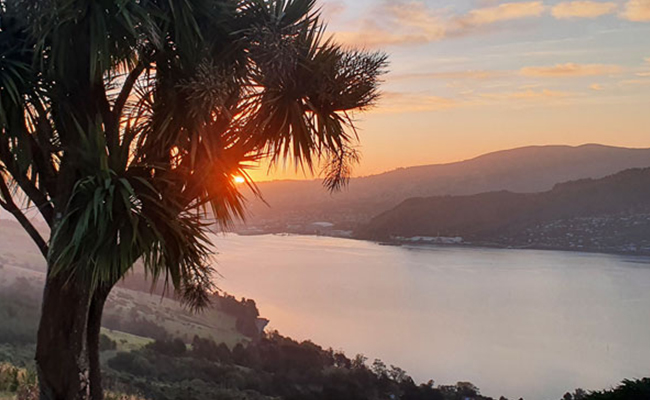
Tī Kōuka: The Sustainability Strategic Framework is driven by seven concepts at it's core, to guide our journey towards achieving our sustainability goals.
Our University aims to be a Tiriti-led sustainability living lab by 2030 – “sustainability will be at the heart of everything we do, with staff and students working together on solutions that should influence our region, country and world,” Chief Operating Officer Stephen Willis says.
A sustainability focus will be spread across our research, teaching practices, design of papers and qualifications, and partnerships with Māori, under Tī Kōuka: The Sustainability Strategic Framework our University of Otago Council approved recently.
The sustainability focus will also stretch across our students' experiences, the daily activities that keep our campuses operating, how we listen to our students, University leaders' decision-making.
Chancellor Stephen Higgs says the framework will help the University “be the best ancestor we can be”.
Mr Willis says that by 2030, our framework envisages Otago producing sustainability experts among our graduates and professional staff, and our sustainability research influencing policy continuously to change society regionally, nationally, and globally – which will attract students and staff from around the world.
The framework includes our University having multi-disciplinary groups and spaces dedicated to generating innovative social and technological sustainability solutions that can be implemented. Our plans will also evolve constantly as needed.
The framework also speaks directly to our place as a University in Aotearoa – our Office of Māori Development staff co-chaired the advisory group to ensure Tī Kōuka aligns with our University's commitment to Te Tiriti and recognises mātauraka Māori's significant part in creating a sustainable future.
“Many sustainability solutions have been known through indigenous generations and from this strong base, we take a bold approach,” he says.
The framework envisages all our campuses and colleges being healthy, welcoming places that help connect us with our environment by 2030, as our University buys and uses resources sustainably, continues driving down our greenhouse gas emissions and is certified as Net Zero Carbon or better.
Our employment practices will also continue to support equity, diversity, and sustainability.
All our sustainability work will be underpinned by strong engagement with communities, industry, and government – and we will also be focusing on our obligations to our Pacific neighbours affected by climate change, Willis says.
The framework – centred around a metaphor of Tī Kōuka (the cabbage tree) – has seven concepts at its core: education, research, leadership and governance, sustainable operations, a regenerative approach, having a regional and global impact, and innovation.
Each concept is anchored in a whakatauki or other cultural reference to Tī Kōuka. To bring those concepts to life, the framework includes an implementation plan (whakamahere):
- Our Sustainability Office will support campuses, divisions, departments, and senior leadership teams to create their own annual sustainability action plans relevant to their areas, as part of their existing strategic plans or as separate documents.
- Every division and northern campus will nominate a person responsible for progressing sustainability, who our University's Sustainability Office will support and that position should be formally recognised.
- An advisory group will be formed to implement Tī Kōuka, to maintain focus. The group will include the nominated people and other staff with relevant expertise.
- Progress on Tī Kōuka's implementation will be reported annually.
- To ensure progress on sustainability is locked-in as normal practice, a new Sustainability Policy will be developed.
Why and what?
Sustainability Office Head Ray O'Brien says the framework looks to 2030 because the United Nations describe that as “the decade of action” needed to protect the future.
Sustainability is often described as meeting present needs without compromising future generations' ability to meet their needs but sustainability efforts are increasingly focusing on regeneration so the world is left a better place.
While our University committed to sustainability transformation when approving its original Sustainability Strategic Framework – 2017-2021 – and made significant progress, our expectations and sense of urgency have increased, O'Brien says.
That is why our University's sustainability framework does not accept causing less harm is enough and “at its heart is the learning and knowledge we continuously develop, share, and challenge”, he says.
Otago was also the first university in New Zealand to sign the international SDG Accord to pursue the United Nations Sustainable Development Goals (SDGs), which cover the range of issues involved in sustainability.
Updating
The new framework included gaining commitment across our University to developing sustainability action plans with shorter-term goals so each area can respond to changes, including those sparked by new or amended legislation and the pandemic.
To gather perspectives and ensure buy-in, the Sustainability Office invited students, academic staff and professional staff from all divisions and campuses to join a new Sustainability Strategic Framework Advisory Group in early 2021, which evaluated the original 2017 framework, developed a vision for sustainability in 2030, and identified a way forward, he says.